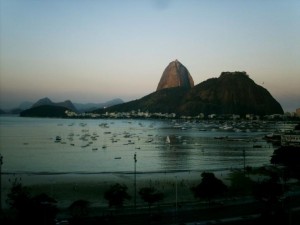Originally published in OtherWords.
President Barack Obama may be steering clear of the Rio+20 Earth Summit, but thousands of government delegates, civil society activists, and business lobbyists are already streaming into Brazil.
I arrived last night and will blog throughout this UN Conference on Sustainable Development. I’ll bring you the latest about the talks among those somber-suited delegates who’ll buzz around a complex of aircraft hangars on the edge of the city. And I’ll sum up the action at the tent city that has sprung up in Rio’s vast and verdant Flamengo Park — where the People’s Summit for Social and Environmental Justice is taking place.

Sugarloaf Mountain, Rio de Janeiro/Shutterstock.com
Then there’s Agenda 21 — a modest and rather toothless action plan for supposedly “sustainable development.” (While over-excited tea partiers may consider that document to be a Soros-funded, left-wing conspiracy for the United Nations to achieve world domination, it never had much impact.)
And although the first Rio Earth Summit successfully established a framework for multilateral environmental negotiations, its impact has remained limited. Nature magazine’s damning report card, which makes that clear, is also very disturbing. Global greenhouse gas emissions have risen at even faster rates than before. We continue to lose biodiversity at an unprecedented rate. Land degradation is causing the continued spread of deserts.
For this reason, many delegates in Rio this time around are simply calling for measures to implement existing commitments. They say that would be better than creating any new corporate-driven initiatives or issuing yet more empty promises. The Third World Network has a comprehensive overview of the key issues, and is publishing regular updates with details of who said what at the Rio+20 talks.
“Green economy” proposals have proven to be some of the most contentious so far. On June 14, the 133 countries that comprise the G77+China (the largest negotiating bloc, representing the majority of the world’s population) walked out of talks on this element of the text. They cited a lack of progress on funding to help developing countries achieve more sustainable development and “technology transfer” mechanisms that could ease patent restrictions to promote the spread of cleaner technologies. Today, they kicked out of the agreement text that would have advocated a “transition to a green economy.”
That’s a win for progressives. Really. Wait — don’t we want a greener economy? Of course we do, but as this briefing, this video , this animation, and this report clearly show, there’s widespread concern that the term “green economy” is being used as a cover by rich countries lobbying for new markets to be created in biodiversity and ecosystems, and new avenues for financial speculation. A truly green economy, by contrast, would recognize the limits of what can be “financialized.” It would protect both the common good and public resources.
The battle between these very different worldviews will continue here over the coming days. The Rio+20 negotiating text remains littered with language that could be used to promote markets for environmental services. And the fight against the anti-democratic variety of green economics must be waged outside this conference too, because the World Bank and other powerhouses are busily building institutions to support these new markets.
Oscar Reyes is an associate fellow with the Institute for Policy Studies’ Sustainable Energy & Economy Network. www.ips-dc.org

